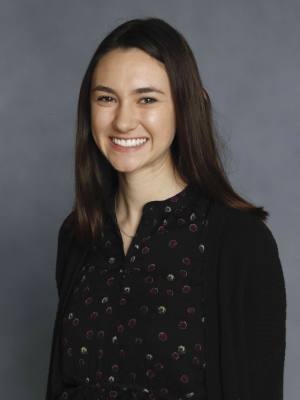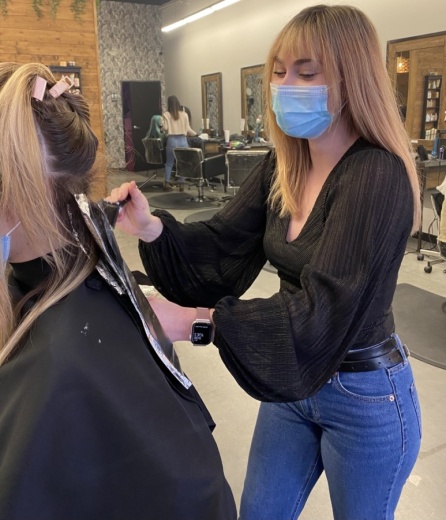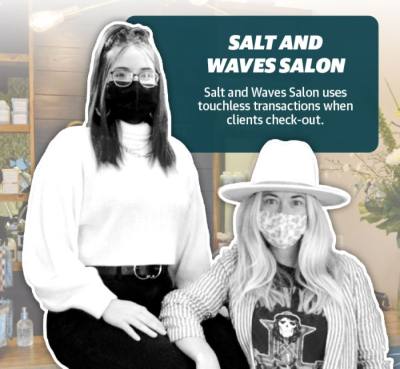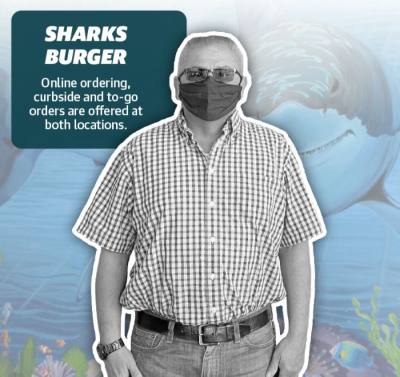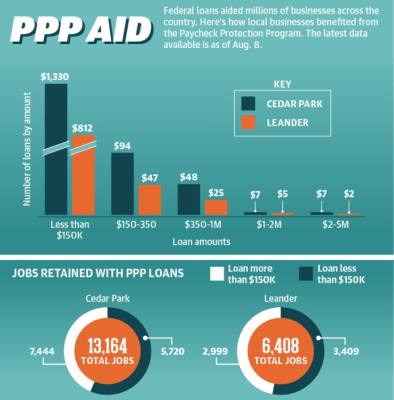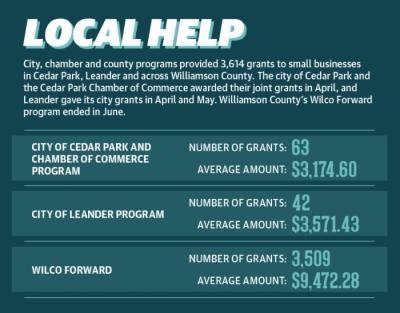In the new year, continued education is important for Bednarek and her stylists to reinspire them after a tough year. She wants to give them the tools to become successful and grow together as a team.
“That, to me, is really important for someone to have passion,” she said. “And we really exceed that beyond what the requirement is.”
Businesses that opened in 2020 faced different challenges. Alicia and Jared Wennstrom opened Humble Pint Brewing Co. in April. They closed and reopened the Leander brewpub four times in its first year. Jared Wennstrom said his industry was “sucker-punched every week” in conflicting instructions from the governor and the Texas Alcoholic Beverage Commission. Today, the taproom runs at 50% capacity. Beers are sold with pretzels to meet state allowances, which requires at least 51% of income to not be alcohol sales.
When the Wennstroms began planning Humble Pint in 2017, their vision did not account for any of the effects of 2020. But the owners hope to implement more of its vision with family games, innovative brewing and an expanded menu.
“I’m very proud of what we’ve done,” Jared Wennstrom said. “It’s a hell of a lot of hard work in this past year.”
planning Humble Pint in 2017, their vision did not account for any of the effects of 2020. But the owners hope to implement more of its vision with family games, innovative brewing and an expanded menu.
“I’m very proud of what we’ve done,” Jared said. “It’s a hell of a lot of hard work in this past year.”
New business models
Humble Pint is one of more than 50 businesses that opened in 2020 across Cedar Park and Leander, according to Community Impact Newspaper’s reporting.
Existing and new businesses alike adapted with curbside pickup, online ordering, telemedicine, added health precautions and more measures to stay open and keep 6 feet away from customers as much as possible.
Brazilian Jiu-Jitzu school Gracie Barra Cedar Park added virtual classes while its center closed for 45 days beginning in March, said owner Fabio Villela. Virtual classes were new to the school and to Villela who spent late nights learning how to produce the videos post-closure.
“We are passionate for every single thing that we’re doing here. When you go online, you cannot pass that passion. You cannot motivate them,” he said. “We have to reinvent ourselves and try to adapt ourselves for the new reality.”
Extra sanitizing, limited contact and teaching with dummies allowed the center to reopen for in-person instruction. Villela said he is a fighter, and his students give him energy to keep motivated to keep in business for another 20 years—at least.
The uncertain, yet booming, real estate market also faced changes. Two to three months after the pandemic hit, homebuyers continued their home searches but changed their priorities to focus on home offices and recreation space.
“People are moving out of the city. People are moving farther out and it became everything about their house,” said Allyson Almeida, broker and owner of Cedar Park-based Austin 512 Realty. “People are wanting to do everything recreational in their house from swimming pools to home gyms.”
Almeida said finding homes for buyers was like the needle-in-a-haystack analogy due to reduced inventory. Homes could have multiple cash offers on its first day of listing. Other homes would have upwards of 50 offers.
Looking ahead, maintaining affordability for locals who are competing with out-of-state buyers is a concern across the growing Austin area, according to Almeida.
“We’re going to see huge changes,” she said.
Increased health visits
Stephanie Zimmermann, a licensed clinical social worker, opened her mental health care practice in late 2019. She started with two therapists and in-person visits, but soon switched to virtual visits in 2020 and added five therapists to match the demand of clients. The pandemic became a realization period for people, especially teenagers, to seek help with growing stressors on their mental health.
“It has impacted them so great that it’s really brought their mental health to the forefront,” she said. “Where they’re like ‘I need somebody else than just my family now.’”
Zimmermann said there is “almost a second wave of stress” in 2021 due to increasing coronavirus case numbers, a rising death toll and the general unknown of the pandemic.
Zimmermann’s hopes in the new year are to expand her therapists’ knowledge and skill base to help more clients, hire more staff with flexible work schedules and to streamline the insurance process. Insurance often adds stress to new clients unfamiliar with their coverage, Zimmermann said.
“My hope is this pandemic will make some positive changes with insurance, and it’s just taking the time to adjust and hopefully there’s changes down the pipeline,” Zimmermann said.
Dr. Mo Jahadi, owner of ChiroFit Wellness Center, saw a big boost for his chiropractic practice last fall due to returning patients, but especially so in January as new patients sought help for pain they dealt with for months while at home. Jahadi’s practice is now expanding to a second location in Jonestown to further serve its patients.
“We definitely had a dip in 2020, but we’re looking to jump back to where we were in 2019 and kind of build from there again,” Jahadi said.
Jahadi, who serves as the president of the Texas Chiropractic Association, said many chiropractic practices across the state saw increased appointments in the fall. Patients wanted to stay out of emergency rooms and large medical offices since telemedicine options are limited in their hands-on field. “I’m very optimistic that we’re going to see business continue to thrive in 2021,” he said. “Any business that made it through 2020 became leaner, became more efficient and learned how to deal with probably one of the biggest challenges we’ll face as business owners.”
Local financial boosts
Thousands of businesses across Williamson County received aid from the county’s small business aid program, and over 100 Cedar Park and Leander businesses received city-funded small business grants due to the economic slowdown.
Bednarek said receiving a loan from the Paycheck Protection Program plus the city and county grants helped her salon immensely while her stylists could not work.“That local support was incredible,” Bednarek said. In 2020, the U.S. Small Business Administration began its Paycheck Protection Program to aid over 5.2 million small businesses with federal loans, according to U.S. Small Business Administration’s latest data released Aug. 8. In Cedar Park and Leander, 19,572 jobs were retained with 2,377 local businesses’ loans, according to SBA data.
Another loan recipient, Sharks Burger, opened its second restaurant location in June, and the Leander business’s loyal customers, a county grant and a PPP loan kept its staff on payroll for both restaurants, owner Dino Bullara said. Sharks Burger also kept to its mission to donate meals to the community’s first responders and to host fundraisers for schools and teachers.
Online orders and curbside pickup still fuel at least 90% of the Leander restaurants’ sales, Bullara said, but these orders are the “wave of the future.” He hopes customers will soon dine-in again and that the Ronald Reagan Boulevard restaurant will feature live music and add a beer and wine menu in the future.
“We learned to adapt—adapt and change as quickly as possible—and to never stop fighting,” Bullara said.


